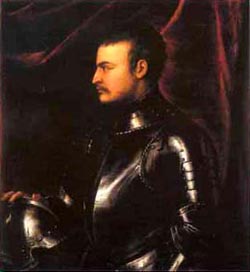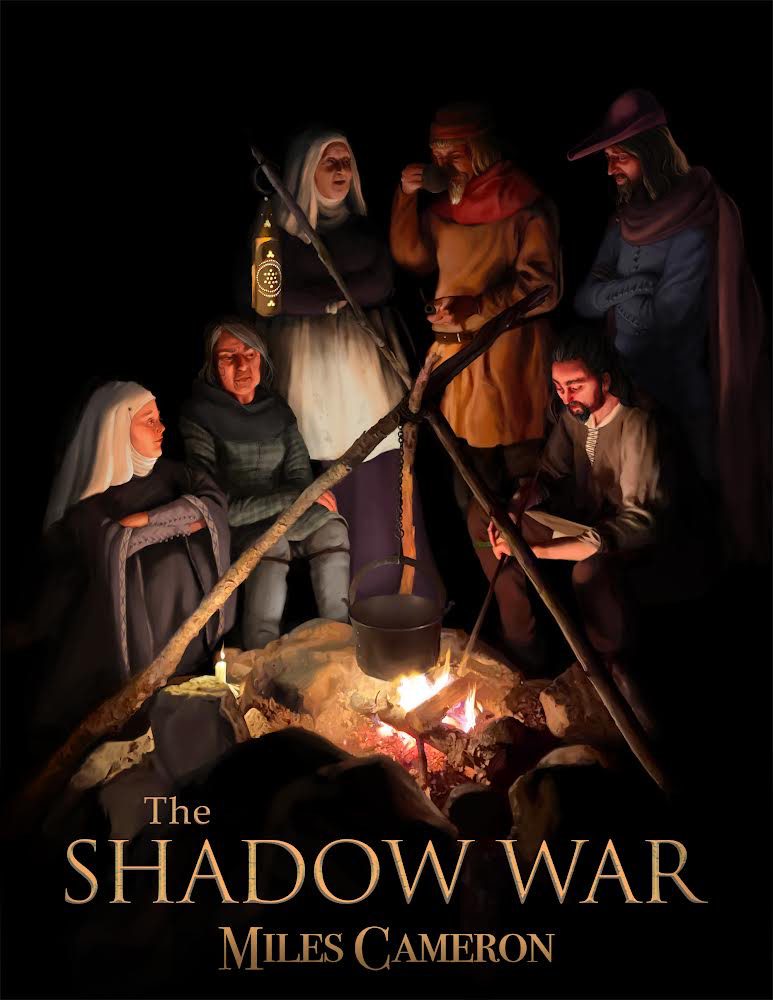
Lodovico di Medici, known as Giovanni delle Bande Nere
Everyone knows the trite, oft-repeated slogan. ‘War is Hell.’ And some know Lincoln’s comment, ‘Military glory–that attractive rainbow, that rises in showers of blood–that serpent’s eye, that charms to destroy… ‘ and we’ve all heard ‘Live by the sword, die by the sword.’ The human race and it’s penchant for violence has coined several thousand worthy slogans about war, death, destruction, and the pointlessness and folly of military adventure. There’s a host of good quotes here if you want to read for several hours. I particularly enjoyed Benjamin Franklin’s quotes, but then, I always do.
But… I write in not one but two genres where violence tends to define story arc and serve as the anvil of character building. There are many reasons for this. I still find war fascinating, although it is the fascination of the serpent. I admire good military tactics and strategy, and abhor foolish ones. I spent time in the military, and I admire its virtues, which are many more than most civilians could credit. Nor are all soldiers and sailors crypto-fascists and extreme conservatives. Nor, in fact, are conservatives so bad. But hey, that’s another topic.
But war sucks. It especially sucks for the young, the non-combatants, and the poor. On the other hand, it is totally possible to enjoy war; I have several friends who do or did. Human beings are incredibly tough, and can learn to enjoy most things, if you treat them badly enough; or, looked at another way, meat eating is fun, if you are an apex predator, and I know a few, and their experience of war is not like that of a Syrian mother with five children trying to escape Daesh/ISIL or a French nun trying to avoid English archers in the 100 Year’s War or…shall I go on?
No. But I could. Refugees… napalm… mass crucifixions… the execution of prisoners… cholera… trenches… the unburied dead of last September… child soldiers (you don’t think those are new, do you?)
OK. Glad I have your attention. Because if you read my books, you enjoy reading about war. That’s a bit of a shocking statement to make, but I enjoy writing them… Wait, I have a point. What I’m getting to is that I can write about war in a way that tells some of the truth about war and still deals with important themes in the Western tradition like chivalry and honor and good leadership skills. Or I can write a sort of war-pornography where corpses litter the stage but they are all, basicly, zombies (even orcs have character and even motivation and can be quite likable), and affectless. That is, their deaths have no affect on you; the killing is fun, the result not worth discussing.
I think that would be wrong for two very different reasons,. The first is a moral reason. I believe I have a moral responsibility as a story teller (and as a veteran) to not romanticize war. (And I think that sometimes I do it anyway.) But more immediately to this blog, I feel it is bad writing. I think that giving your main characters charmed lives and affectless zombies to kill is cheating. It may be comfortable, or like a video game you like, but it lacks the emotional involvement and difficulty that makes writing really good and reading really… experiential. By which I mean, a valid experience.
According to Aristotle’s Poetics (which is the sort of cornerstone of Western ideas of story and so on) motivation creates character and character supports plot and plot supports story (creates and defines story. Yes, this is a broad brush…)) And yes, I really believe all this stuff… my father, the author Kenneth M. Cameron, taught me the Aristotelian hierarchy pretty much as soon as I learned to write. Aristotle made another observation of dramatic action; that action rests of creating feelings of pity or fear. I think he left some other feelings out, but I’ll merely nod at pity and fear and say that, if you are writing about war and violence, you probably should work to evoke pity and fear in your readers…
From the sublime to the nerdy… I’m a lifelong gamer, and I didn’t learn to play RPGs from my dad, but I did learn a lot about writing from being a GM. I’ll reduce it all to a sentence… unless the characters have a real fear of death, the game will never be worth the candle. You don’t have to kill many; it’s a careful game of numbers, and all ‘Dans ce pays-ci, il est bon de tuer de temps en temps un amiral pour encourager les autres – “In this country, it is wise to kill an admiral from time to time to encourage the others.” By the way, Voltaire said that of Admiral Byng, who was executed by Great Britain for failing to relieve Minorca. Shot on his own quarterdeck, I believe. Dead. No resurrection. For… failing to win.
But I digress. My point, if there is one, is that for the readers experience of war to be valid, characters have to be threatened. And sometimes, favorite characters have to die. Sometimes they have death scenes (like Father Arnaud in Dread Wyrm) and sometimes they just die and you find out later (like Niceas in Storm of Arrows) or really deeply loved characters die in five words (like Jeremy in Washington and Caesar.) I think it’s just as trite to give every good (or fun, if evil) character a gallant death as to provide convenient zombies for killing or to have no death at all; if there’s one thing we know about war, it’s that it is no respecter of persons. Charles V is supposed to have asked ‘Was there ever an Emperor killed by a cannon ball?’ as if insinuating that God’s hand (or perhaps the novelist) was watching over him, but Constantine XI died at Constantinople (perhaps a cannon ball and perhaps not) and Charles III the Duke of Bourbon and commander of the Emperor’s armies ate a cannon ball at the attack on Rome.
In fact, heroism is not a suit of armor to protect the brave. The picture at the head of this article is that of Giovanni Delle Bande Nere, an Italian condottierre of the early 16th century and a promising candidate to unify Italy. He was everything a boy’s own hero ought to be (OK, in a grim/dark way…) a brilliant soldier, a superb swordsman, a lead-from-in-front officer. He loved his troops and they loved him; he took care of them better than most of his contemporaries, and in fact he was years ahead of his time in many, many innovations. He defeated the Chevalier Bayard in a Petit Guerre action. And he defeated the redoubtable Lansknecht leader Georg von Frundsburg. He was on his way…
Cannon ball. Age 28. No second life, no magic, no healers.

This is not his breastplate, but I’ll bet it was messy to clean this one.
Nelson. Charles XII of Sweden. Leonidas of Sparta. Wolfe at Quebec. Geoffrey de Charny at Poitiers. Herodotus is full of them.. his references to the hero of one battle almost always end with how that hero died in the next battle or the one after. Sir John Chandos died in action and so did about 1/3 of the great English and French knights whose names come down to us. Athenian polemarchs and Strategoi, Spartans, and Theban generals all died like flies in combat. Epaminondas comes to mind… Callimachus…
Zepata. Saul. Macbeth. Richard III. Demosthenes. Jim Bowie AND Davy Crockett. Tecumseh. Jeb Stuart. Marcus Claudius Marcellus.
These men were HEROES. Every one of them, despite some war crimes, the occasional rape or murder, and some ill-planned campaigns, was the very stuff of novels (actually, most of them are… literally).
They died.
And they don’t begin to be the tip of the iceberg of casualties in the lower ranks. Aides, officers, leaders of squadrons, colonels and centurions and taxiarchoi and knights. And squires, pages, legionaries, landsknechts, tribespeople, women (a huge proportion of war casualties, considering that they are supposedly ‘non-combatants’) children, slaves, dogs, horses… oh God, the horses.
Ernest Hemingway said:
They wrote in the old days that it is sweet and fitting to die for one’s country. But in modern war, there is nothing sweet nor fitting in your dying. You will die like a dog for no good reason.
I’d like to suggest that Hemingway was missing how much that had always been true. Most people die like dogs in war, for no reason.
So as long as I write about war and violence, characters will die. And, even worse, some will die ‘for no reason.’ I will build a character arc with motivation and great stuff and then…
…cannon ball. Or dysentery. Or childbirth. (The greatest historian of Chivalry IMHO, Maurice Keen, suggests that if we had accurate numbers we’d find that it was more dangerous to be a well-born 16 year old aristocratic woman in the Middle Ages than to be a knight.) I don’t do it to be mean, or because I’ve run out of things to say.
War kills. People die, and seldom for reasons we understand or appreciate.
Good fiction has to at least resemble reality.


Reblogged this on parmenionbooks and commented:
Catch up with the latest great blog from Christian Cameron
What an excellent post.
Of course people die, and not just in war. And I especially like the way you emphasise that the innocent die on a scale equal to the men of war. In fact, I often prefer to read the innocent POV (a character who isn’t a serviceman, a subaltern or a general) during those times. Inevitably there is an earthy philosophy that emerges which makes that character’s death even more poignant than the military death.
I know nothing of the military in war and claim to know very little of an innocent’s point of view but I know fear well and I have seen PTSD in action and my heart breaks for all involved in a war. Which makes for reading a fictionalised account all the more intense.
Thanks so much for this intelligent and intuitive post.
Well, anyone who has a knowledge of animal husbandry can tell you that you don’t need as many males as you do females. Hence veal. I see war as a similar process. Got to kill off a bunch of your surplus young males every generation or so.
At the same time it is foolish to kill off females, young, and anyone engaged in making the territory you covet profitable. So, once again you should only target young, military capable males.
Thus warfare should be made into a type of “sport” engaged in by professionals against other professionals. Leave the hoi-polloi alone. Man has seldom approached this status. Perhaps now with modern telecommunications it would be interesting enough to become possible and profitable.
There could be leagues of different period warriors like re-enactors; something to suit everybodies taste. Although I’m getting a bit grey and long in the tooth I’d opt for 18th. century European warfare. Events could be held for each time and ethnic group to combat their traditional foes; or mis it up a bit: I could finally find out who would win a fight between 19th. century Zulus and 5th.cent B.C. hoplites!
This would be out exclusive outlet for warfare and killing. Anyone caught slaying his fellow man outside this parameter would be apprehended and hung . drawn and quartered on mass-media to discourage others!
Тhis is all so true unfortunately. And it’s really necessary to worry for the characters to keep interested and to sympathize with them. Thanks for a very interesting and informational article!
I love that you brought this up because it bothers me tremendously when readers criticize authors for killing off characters and presume that the author did it purely for shock value (which happens, I admit, but readers jump to that conclusion way too often these days). I heard authors talking about getting hate-mail after killing off characters. Makes me glad I’m not an author. It must be sad working hard on something, creating a character, making a tough decision to kill a character (because come on readers, the author probably loves the characters at least as much as you!) and then having readers claim the character’s death was gratuitous.
I hope many people read this blog and realize how wrong it is to give a bad review or dislike a writer just because characters died. Trust that the author knows what he is doing!
Having said that and though I totally believe all your reasons for killing off characters, I’m still very sure that authors get a kick out of torturing readers. 😉 I’m still not over at least three of the deaths that occur in Dread Wyrm…
Oh, I can’t leave without mentioning that what happened to Gabriel near the end during the final battle? That almost shocked me as much as if he had died?! I read it three times because I thought I must have read it wrong, English is not my mother tongue, so for a couple of nanoseconds, I insisted that I had misunderstood. I was so upset and surprised. And then I was surprised that I was surprised. Because I do know such injuries happen in war. But even knowing that didn’t lessen the shock. That made me realize how rarely you see such a thing even in books with many battles. I needed an explanation for myself as to why I was so upset and surprised by an injury that can obviously happen easily in such a fight. And the only explanation I could come up with ties in with what you said about romanticizing war. Because in death during an important battle, there is at least some sort of beauty or some sort of comfort for the reader: at least the hero died heroically. Same as when authors let characters suffer for love or loss. We can find something romantic in that kind of pain as well. There is a word in German “Wohlfühlschmerz” which kind of means feel-good pain – but not as in sports whilst stretching, but rather like melancholic music making you cry. It hurts, but it’s beautiful, and you like that feeling. ) So, dying heroically whilst looking pretty in awesome armour can at least give you a certain Wohlfühlschmerz, but what happened to Gabriel is not pretty , not romantic, but nasty and reminded me that our heroes are not invulnerable and that war is ugly. Same goes when characters die in five words or, even worse, off page and the reader is just told later. No Wohlfühlschmerz at all. But I do think that the mixture of all those different ways to die or get hurt made the reading experience so much more intense. I really love it when books have such an emotional impact. And I like that we were told from the start that war is horrible and messy. The series starts off (I think it’s even the very first scene) with John Crayford telling us how terrifying war is, despite all the shining armor and good stories, and that there is no need for him at all to be jealous of The Red Knight.
As weird as that compliment may sound, I do like the way you kill off characters and the way it makes me sad, frustrated and angry. But please don’t kill Gabriel. 😉
Kineas went as you say. I still miss him!
I miss him too… but even back then I was trying to make this point…
I have read a number of great books where the “central” character was suddenly gone, the sense of the rug being pulled from under ons feet was part of the experience. The concept of stories focusing on a central person would be worth of a dissertation… But I think it is central to our current culture, which is very focused on the individual.
I think in addition to the points you made the emotional attachment we have for a central/important personality in a narrative, ons we identify with, who is then “killed off” can provoke a response in us that while not a recreation of actual experience of loss at least representative of it